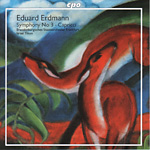As with many mid-20th-century composers, Eduard Erdmann’s music became increasingly expressionist as his style developed. His Symphony No. 3, though in four traditional movements (allegro, andante, scherzo, allegro), employs a largely atonal harmonic language that in terms of overall style sounds closest to Berg, but without that composer’s undercurrent of pathos. And while the Third is not as pleasant to listen to as Erdmann’s prior two symphonies, it remains mildly interesting for its compositional technique and expert orchestration.
The later Capricci initially belies its title with a long, slow introduction that threatens to benumb the listener with its arid harmonies and undistinguished themes. The following dance section enlivens things considerably, but the persistent tonal dullness acts as a drag on the proceedings. In his Josef Tal recordings for CPO, conductor Israel Yinon already has shown a remarkable ability to render the bitter more or less palatable, and he achieves similar results here, thanks to first-rate playing by Frankfurt’s Brandenburg State Orchestra. CPO’s spacious recording provides excellent clarity and presence. But let’s not kid ourselves: this is not very enjoyable listening.
































